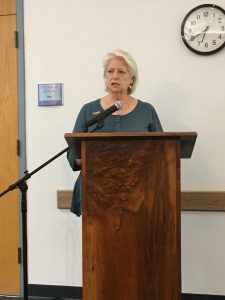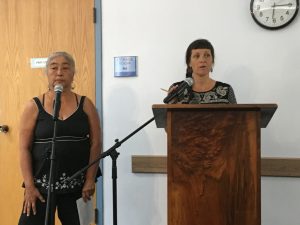by Dave Waddell
They aren’t yet holding hands and singing “Kumbaya,” but citizens wanting culture change at Chico PD are in basic agreement with Police Chief Mike O’Brien on principles for reform.
The group, Concerned Citizens for Justice (CCJ) — which will hold its monthly community meeting this evening — has produced a six-point plan for reform to encourage use of de-escalation practices by Chico police and to ensure there is training in behavioral health crisis intervention.

CCJ meets at 5:30 p.m. Tuesday, Aug. 14, at Rhema Hall, 574 E. 12th St. in Chico.
CCJ leader Emily Alma, a longtime critic of what she calls the “tactics of intimidation” of the Chico Police Department, said O’Brien has been receptive to the group’s concerns.
“In principle, the vision of Concerned Citizens for Justice and the mission of the Chico Police Department are in alignment,” Alma told the scores of citizens who turned out for a “community conversation” June 18 at the Chico branch of Butte County Library. “And that seems like a great place to begin this endeavor.”

Attending the meeting and answering a number of questions was O’Brien, who noted that CCJ’s proposals come from the report of President Barack Obama’s Task Force on 21st Century Policing.
“I was able to go back to the White House … and actually hear about these principles first hand,” O’Brien said at the June meeting. “And they’re all very, very sound. I agree with them in principle. I just want to say that as your chief of police, there’s a lot of … common agreement that we can find actually here tonight. I wanted to let the committee know that.”
Alma said the killing by Chico police of Desmond Phillips in March 2017 was the driving force behind CCJ’s formation a few months later. Phillips, a young black man in mental crisis, was shot 11 times in his own living room.
“There was a shared sense that we must do something,” Alma said. “This was not right, this death.
“Citizen oversight boards are springing up all over the country – from Albany, N.Y., to Fort Collins, Colo., to San Diego, Calif. This is a movement, and we’re part of it. We’re right in time.”
Another CCJ leader, Jill Bailey, said at the June meeting that improved crisis intervention by law enforcement will “save many lives.”
“Our vision for our community starts with de-escalation becoming normal practice,” Bailey said. “We expect law enforcement to make every effort to prevent injury.”
Diane Suzuki of CCJ said the de-militarization of local police agencies is critical.
“When police officers are armed like combat troops, they diminish relationships and intimidate citizens,” Suzuki said in June. “Law enforcement may underestimate the impact of militarized images of themselves. … First and foremost we’d like our police officers to serve as guardians, not warriors.”
Margaret Swick, also of CCJ, asked the June meeting attendees to reflect on how elected officials have responded to the “many incidents” of deadly force by law enforcement in Butte County.
“Who is holding our police accountable?” asked Swick. “Actually, we don’t really know, do we?”
Swick said political use of “the crime card” can reduce support for citizen oversight and block transparency: “As we know, fear sells.”
Swick spoke in support of Assembly Bill 931, which she said would provide a “one-word change” in state law for use of force by law enforcement personnel from that which is “reasonable” to that which is “necessary.” Swick described the difference as “profound” in that it would require police to try to de-escalate situations whenever possible.
Swick said that while police violence is relatively rare, when it does occur it must be subject to civilian review. She said another proposed state law, Senate Bill 1421, would help ensure such oversight by making officers’ records related to the use of force and sexual assault available to the public as well as to hiring agencies.
“Now those records are completely hidden from public view,” Swick said. “That must change. The public is not safe unless we have this information.”
Concerned Citizens for Justice reported having “15 new attendees” at its monthly meeting in July. The group will sponsor a “Forum on Law Enforcement for Chico City Council Candidates” on Sept. 24 from 6:30 to 8:30 p.m. at Chico’s branch library.
“We do know that the most important thing we must do is listen to our community, be fully inclusive, and work together to develop the best oversight model for us,” Swick said. “We need the next steps to be fully collaborative.”
More information may be obtained from chicocitizens4justice@gmail.com.
Dave Waddell is news director at ChicoSol.
